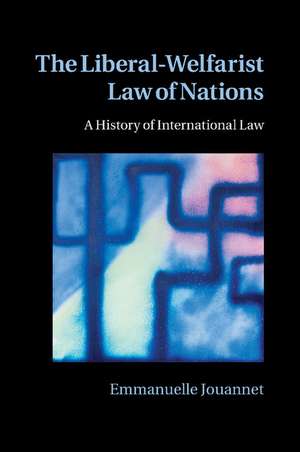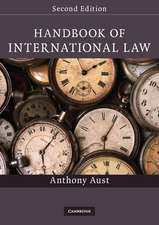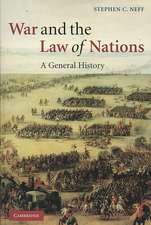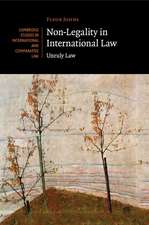The Liberal-Welfarist Law of Nations: A History of International Law
Autor Emmanuelle Jouannet Traducere de Christopher Sutcliffeen Limba Engleză Paperback – 19 noi 2014
| Toate formatele și edițiile | Preț | Express |
|---|---|---|
| Paperback (1) | 287.28 lei 6-8 săpt. | |
| Cambridge University Press – 19 noi 2014 | 287.28 lei 6-8 săpt. | |
| Hardback (1) | 729.08 lei 6-8 săpt. | |
| Cambridge University Press – 25 ian 2012 | 729.08 lei 6-8 săpt. |
Preț: 287.28 lei
Nou
Puncte Express: 431
Preț estimativ în valută:
54.97€ • 59.90$ • 46.32£
54.97€ • 59.90$ • 46.32£
Carte tipărită la comandă
Livrare economică 23 aprilie-07 mai
Preluare comenzi: 021 569.72.76
Specificații
ISBN-13: 9781107470941
ISBN-10: 1107470943
Pagini: 328
Ilustrații: black & white illustrations
Dimensiuni: 152 x 229 x 18 mm
Greutate: 0.44 kg
Editura: Cambridge University Press
Colecția Cambridge University Press
Locul publicării:New York, United States
ISBN-10: 1107470943
Pagini: 328
Ilustrații: black & white illustrations
Dimensiuni: 152 x 229 x 18 mm
Greutate: 0.44 kg
Editura: Cambridge University Press
Colecția Cambridge University Press
Locul publicării:New York, United States
Cuprins
Introduction; Part I. The Modern Law of Nations: 1. The law of nations of the Moderns: a new discipline; 2. The liberal purpose of the modern law of nations: liberty, equality and security for states; 3. State interests and self-esteem; 4. The modern law of nations between free-enterprise and protectionism; 5. The welfarist purpose of the modern law of nations: the happiness of the people and the advancement of states; 6. Cooperation and assistance to states between liberalism and welfarism; 7. The liberal-welfarist law of nations: a code of good conduct to discipline European states; 8. Goodness, freedom and justice; Conclusion; Part II. Classical International Law: 9. A modern commentator turned classical: the Vattelian moment; 10. The triumph of the liberal purpose of international law; 11. Liberal international law outflanked. A welfarist purpose for the rest of the world; 12. Intellectual and political explanations and justifications for the change; 13. Classical international law in the age of free-enterprise: between free-trade and protectionism; 14. Liberal vision, dogmatic foundation and the appeal of liberalism; 15. Concerns about social and economic inequality. The emergence of a new welfarist purpose; 16. The emergence of concerns for human rights; Conclusion; Part III. Contemporary International Law: 17. Continuities and discontinuities of the classical model; 18. The two liberal purposes of contemporary international law; 19. The dilemmas of the new liberal purpose (I): democracy, human rights and the rule of law; 20. The dilemmas of the new liberal purpose (II): humanitarian interventions, identities and cultures; 21. The status report and general prospects for the new liberal and democratic purpose; 22. The economic liberalism of contemporary international law: between Keynesian objectives and the triumph of free trade; 23. The general advancement of the welfarist purpose: characteristics and difficulties; 24. The specific advancement of the welfarist purpose: Third World(s) and development; Conclusion.
Notă biografică
Descriere
Emmanuelle Jouannet explores the concept of international law from the European Enlightenment to the post-Cold War world.















